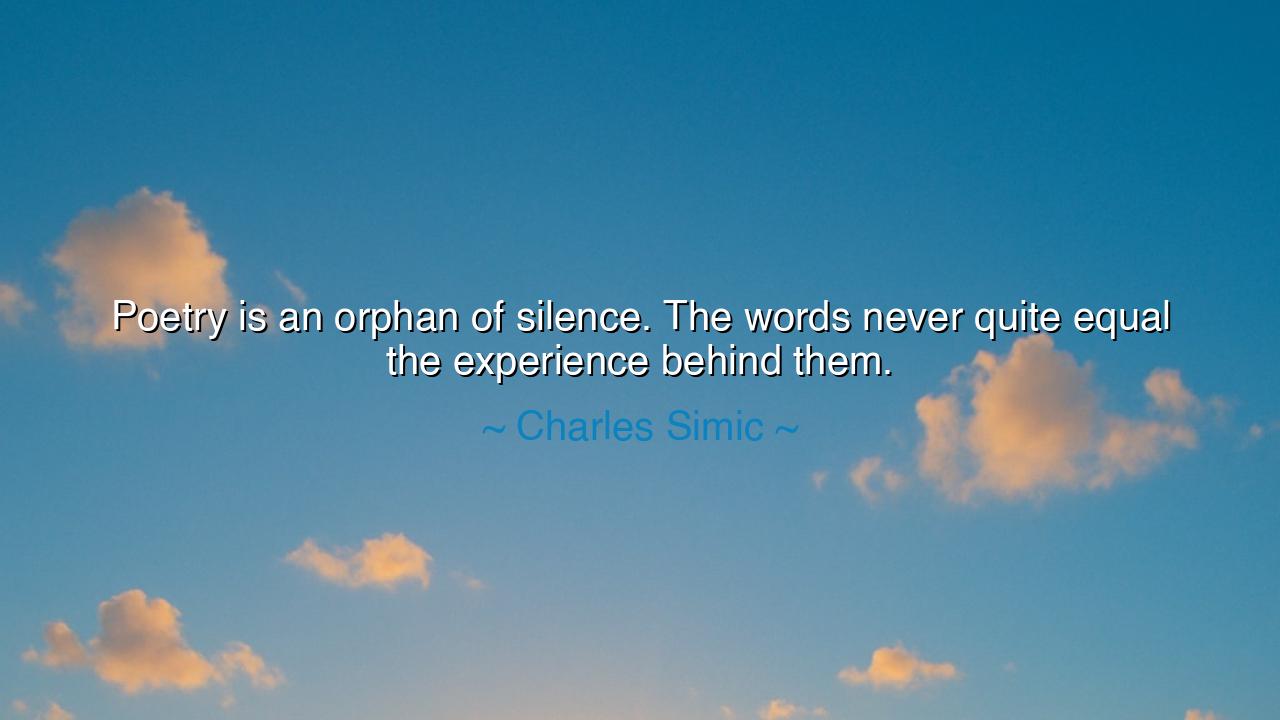
Poetry is an orphan of silence. The words never quite equal the
Poetry is an orphan of silence. The words never quite equal the experience behind them.






Host: The room is quiet, the fading light of evening casting soft shadows across the floor. Outside, the city continues its hum, but inside, the atmosphere feels more reflective, almost contemplative. Jeeny sits at the table, her fingers lightly resting on a book, but her mind clearly elsewhere. Jack stands near the window, arms crossed, his gaze distant as he watches the world below.
Jeeny: (her voice soft, almost meditative) “You ever think about how words can only capture a fraction of what we really experience? Like, how sometimes, no matter how well we express ourselves, we can’t fully communicate what’s in our hearts or minds?”
Jack: (glancing over at her, his voice dry, but intrigued) “Words not capturing the full picture? I think that’s true in a lot of ways, but isn’t that part of their power? They give us a way to communicate even when we can’t fully describe everything.”
Jeeny: (nodding slowly, her voice gaining momentum as she continues) “I was thinking about something Charles Simic said: ‘Poetry is an orphan of silence. The words never quite equal the experience behind them.’ It made me realize how much poetry, and really all forms of expression, are attempts to bridge the gap between experience and words. But the real feeling, the depth of the experience, is often beyond what we can say.”
Jack: (pauses, his brow furrowing slightly as he processes her words) “So, he’s saying that poetry, like all language, is always just an attempt to capture something that’s too big for words? That no matter how we try, the true experience can’t ever be fully expressed?”
Jeeny: (smiling gently, her eyes steady with understanding) “Exactly. Poetry tries to put the inexpressible into words, but those words will always fall short of the original experience. And that’s part of what makes poetry so powerful—because it’s an attempt to connect with something larger than language, something deeper, that can only be felt, not fully articulated.”
Host: Jeeny’s words seem to resonate in the room, like a quiet truth about the limitations of language and the boundless nature of experience. Jack stands still, his gaze softening as he reflects on the idea that words, though powerful, are only a partial expression of what we truly feel. The world outside continues, but inside, the conversation feels alive with the realization that language, particularly poetry, is always in search of something that transcends its own boundaries.
Jack: (his voice quieter now, almost thoughtful) “I think that’s why poetry can hit us so deeply. It’s like the words are trying to hold something vast, something that can’t be fully captured. And even though they fall short, they still convey something real, something meaningful.”
Jeeny: (nodding, her voice calm, but filled with a sense of quiet clarity) “Exactly. Poetry doesn’t need to capture everything—it just needs to give us a glimpse of the feeling, the truth behind it. The silence that comes before or after the words is where the real experience lies. Poetry is about that space between words, about expressing the inexpressible.”
Jack: (pauses, his expression thoughtful as he processes her words) “It’s like language is both a tool and a barrier. It allows us to connect, but it also limits us in some ways because we can’t ever fully convey what we feel. But still, we try. And maybe that’s what makes poetry so beautiful.”
Jeeny: (smiling warmly, her voice filled with a quiet appreciation for the complexity of expression) “Exactly. It’s the attempt that matters. The way poetry reaches for something beyond itself, even though it knows it can never truly capture it. That’s where its power lies—both in what it conveys and in what it leaves unsaid.”
Host: The room feels quieter now, the weight of the conversation settling into something deeper, more profound. Jack looks out the window again, his expression softened as he reflects on the power of language and the space that exists between words and experience. Jeeny watches him with a quiet satisfaction, knowing that sometimes, the most profound connections are made in the spaces between what is said and what is felt. The world outside continues its steady rhythm, but inside, there’s a shared understanding that language, especially poetry, is an ongoing attempt to touch something beyond the reach of words.






AAdministratorAdministrator
Welcome, honored guests. Please leave a comment, we will respond soon